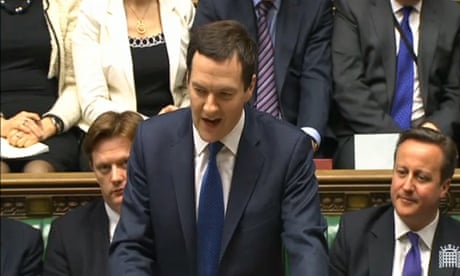Despite coming under huge pressure to raise the 40% tax threshold before the budget, George Osborne largely stuck to his tried and tested strategy – raising personal tax thresholds, while at the same time forcing more workers to pay higher rate tax.
The chancellor confirmed last year's announcement that the amount workers can earn without paying tax will rise on 6 April to £10,000. Ignoring warnings from the former chancellor Lord Lawson that too many people will end up paying the higher rate, Osborne raised the 40% threshold from £41,450 to £41,865.
But from April 2015, Osborne said the point at which workers would be taxed would rise to £10,500, a long cherished Lib Dem policy. He confirmed that the higher rate threshold would be increased by another below-inflation rise of 1% to £42,285 in April 2015.
From this April, workers will see a small increase in their take home pay as a result of changes to personal allowances, although it will be unlikely to be enough to make up for the increases in household bills.
A couple earning £20,000 and £18,000 respectively will see their joint tax and National Insurance bills fall by around £270 a year as a result of the tax changes that come into force next month. A single pensioner with a £10,000 a year private pension will be £123 a year better off after April, once pension and tax changes are taken into account.
The biggest impact will be felt by those earning £42,000, who from next month will find themselves higher rate tax payers, and will be required to declare any extra income such as interest on savings, overtime, or share dividends – and pay 40% income tax on those earnings.
Since the coalition took office four years ago, "fiscal drag" means the higher-rate threshold has dropped by £4,910 in real terms, putting an extra 1.4 million people into the 40% bracket.
Alison Hill, tax director at PwC, warned of April's tax cut at the bottom:
"The full benefit of the 2013-14 personal allowance increase is not being passed on to those on the cusp of the higher-rate tax threshold. The personal allowance will increase by £560 on 6 April this year, however the higher rate tax threshold has only been increased by £415. There is still an actual reduction in the basic rate tax band of £145."
Greg Limb, tax partner at KPMG, said: "After several years of seeing any gain through the personal tax allowance rising being cancelled out by a drop in the amount at which the 40% rate kicks in, now at last most higher rate tax payers will see a reduction in their income tax liability, of around £180. While a relatively modest amount in the scheme of things, I am sure it is something that individuals will welcome."
Child benefit, which has been frozen for the last three years and in effect removed from any household in which one earner takes home £60,000 or more, rises 1% from April. It means mothers will get £20.50 per week for their first child, and £13.55 for any siblings. Households in which one earner takes home between £50,000 and £60,000 now have a proportion of the child benefit clawed back through the self-assessment process.
In a separate move, the chancellor confirmed that from April 2015, married couples and civil partners will be able to transfer £1,050 of their income tax personal allowance to their spouse or civil partner. Couples where neither partner is a higher or additional rate tax payer will be eligible to transfer. The transferable amount will be set at 10% of the personal allowance in each tax year.
For those who can pay tax, but repeatedly fail to do so, the chancellor is to give new powers to HM Revenue and Customs to raid their accounts.

Comments (…)
Sign in or create your Guardian account to join the discussion